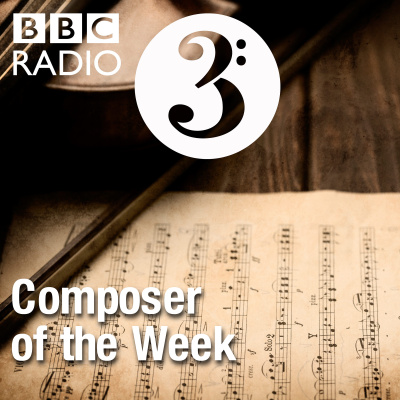Sinopsis
BBC Radio 3's Composer Of The Week is a guide to composers and their music. The podcast is compiled from the week's programmes and published on Friday, it is only available in the UK.
Episodios
-
Arthur Sullivan (1842-1900)
14/04/2023 Duración: 57minSir Arthur Sullivan became the most renowned composer of the Victorian era, with his fame spreading across Europe and America too. His output spanned many genres including oratorios, a symphony, chamber music, hymns and anthems, but it was for his collaboration with the librettist W. S. Gilbert on operetta’s that he is best remembered today. He was a personal friend to royalty, and he was knighted when he was in his early forties. He also had a liking for playing cards, buying race horses and gambling, frequently loosing the substantial earnings from the stage works he’d composed. Sullivan became a pillar of the British musical establishment, so that when he died, despite wanting to be buried with his family in Brompton Cemetery, he was laid to rest in the crypt of St Paul’s Cathedral, with an additional service at the Chapel Royal in St. James’s Palace. Music Featured: HMS Pinafore (Overture) HMS Pinafore (When I was a lad) O Israel Overture ‘In Memorium’ Will he come? Symphony in E major, ‘Irish Sympho
-
Hildegard of Bingen and Isabella Leonarda
07/04/2023 Duración: 01h11minAs Christians around the world prepare for Easter, Donald Macleod explores the life and music of two nuns who were also composers. Though Hildegard of Bingen and Isabella Leonarda lived five centuries apart, their stories and music are connected by their shared faith and their shared vocations. Both lived cloistered lives, shut away in convents and cut off from the everyday concerns of the societies in which they lived. Yet, they also enjoyed a profoundly rich and human connection with the world and with their God, revealed in the music and poetry they created and sent into the world.Music Featured:Hildegard: Spiritus Sanctus Vivificans Leonarda: Sonata, Op 16 No 8 Hildegard: Columba Aspexit Hildegard (ed Wishart): O frondens virga Hildegard: O virga ac diadema Leonarda: Memento rerum Leonarda: Volo Jesum, Op 3 No 4 Leonarda: Sonata, Op 16 No 3 Leonarda: O anima mea Leonarda: Dixit dominus, Op 19 Hildegard: Ordo Virtutum (Prologue and Scene 1) Hildegard: Antiphon, O quam mirabilis est Leonarda: Purpurei Flor
-
Sergei Rachmaninov (1873 – 1943)
31/03/2023 Duración: 01h05min150 years ago this week, Sergei Rachmaninov was born: one of the finest pianists of his generation, touring the world in the 1920s and 30s as a musical megastar. Composing had been his real passion since childhood, and towards the end of his time in Russia before the Revolution, it was farming. Though St Petersburg and then Moscow was his base for much of his early life, it was Ivanovka – a country estate deep in the Russian countryside - that formed him. The house and the land surrounding it were a major source of his creative inspiration until his last visit in 1917. Donald Macleod explores how important Ivanovka was to Rachmaninov, and how he carried the precious memory of it with him when he left it behind for a life of exile.Music Featured:Lilacs op 21, No 5, ‘Siren’ Piano Concerto No. 1 (mvt 1) Dances from Aleko Cello Sonata in G minor (mvt 1) Vesna Symphony No 2 (Mvt 2) Songs Op 34, No 12 Piano Concerto No 3 (Mvt 1) All-Night Vigil (Excerpt) Piano Concerto No 2 (Mvt 1) Etudes-Tableaux Op 39, No 6 The
-
Georges Bizet (1838 – 1875)
24/03/2023 Duración: 57minGeorges Bizet’s story ought to have been a very straightforward one. It was clear to everyone who met him just how brilliantly and excitingly talented he was. He was also fortunate to live and work in Paris, a city laden with musical opportunities in the mid-nineteenth century. Donald Macleod shows how Bizet’s life proved more challenging and event-filled than anyone might have expected – and that success can never be guaranteed!Music Featured:Carmen (extracts) Symphony in C, III. Scherzo Le Docteur Miracle: Overture L'Arlesienne Suite No. 2 (arr. Guirand), IV. Farandole Te Deum Roma, II. Allegro Vivace & III. Andante molto Vasco da Gama: Aria, “Ouvre ton Coeur” Les Pêcheurs de Perles: Duet,“Au fond du temple saint” La jolie fille de Perth: choeur de la Saint-Valentin (Act 4) Variations chromatiques Jeux d'enfants: No 3 ‘La poupée’ Djamileh: Overture L'Arlesienne Suite No. 1: I. Prelude & II. Minuetto Patrie OverturePresented by Donald Macleod Produced by Chris TaylorFor full track listings, includin
-
Johanna Müller-Hermann (1868-1941)
10/03/2023 Duración: 01h27minJohanna Müller-Hermann once held a significant place as a composer and teacher in Vienna, yet has been largely forgotten over the decades since her death in 1941. Radio 3 has been working to unearth her music and story through its Forgotten Women Composers project, in collaboration with the Arts and Humanities Research Council and Dr Carola Darwin. This week, Dr Darwin and Professor Robert Evans join Donald Macleod to explore this fascinating composer and her times. Their series includes many specially recorded works by Müller-Hermann that have sat neglected in dusty archives for decades.Müller-Hermann was greatly celebrated in her own lifetime and moved in eminent musical circles. She studied with Zemlinsky, befriended Alma Mahler, and also corresponded with Arnold Schoenberg. She went on to teach at Austria’s New Vienna Conservatory where students travelled from as far away as America and the UK to study with her. She became a pivotal figure in Vienna’s cultural scene and her music was regularly performed a
-
Barbara Strozzi (1619 – 1677)
10/03/2023 Duración: 01h11minThe singer, and composer Barbara Strozzi neither held any position at church or court, nor had a consistant patron, and yet she published eight volumes of her own music, and had more secular music in print than any other composer of the era. Donald Macleod is joined by Professor Laurie Stras to explore the life of this extraordinary musician, and the world of 17th Century Venice in which she lived and worked. This was a world in which, despite the acknowledged successes of female artists in literature and music, being a successful composer seems to have aroused suspicion, and brought accusations of impropriety.Music Featured:Mi fa rider la speranze, Op.7’10 Che si puo fare, Op 8’6 Sonetto Proemio dell'Opera, Op 1’1 Godere in gioventù, Op. 1’12 L'Usignuolo, Op.1’5 Il contrasto di cinque sensi, Op. 1’14 Parla alli suoi pensieri, Op.6’5 L’Amante segreto, Op. 2’16 Sospira respira, Op.6’17 Godere e tacere, Op.1’9 Cuore che reprime alla lingua di manifestare il nome della sua cara, Op.3’1 La sol fa, mi, re, do, Op
-
Thomas Tallis (1505 – 1585)
20/02/2023 Duración: 59min“So great a musician are you.....that if the Fates carried you off.....music would be mute.” So wrote a contemporary of Thomas Tallis, showing us just how highly this composer was regarded in his own time. Over the course of this week, Donald Macleod traces the career of Tallis, unquestionably one of England's greatest ever composers. We follow him from the early faint mentions of the composer in Dover Priory, to his 40-plus years serving four successive monarchs as part of the Chapel Royal, and through the upheaval of one of the most tumultuous periods in all of English history.O Sacrum Convivium Lamentations of Jeremiah I & II Euge celi porta Alleluia. Per te Dei genitrix Ave, rosa sine spinis When shall my sorrowful sighing slack Sequence: Celeste Organum - Agnus Dei Magnificat for 4 voices Salve Intemerata Mass for four Voices Magnificat for 5 voices 5 part Litany Sancte Deus Hodie nobis caelorum Videte Miraculum for Vespers on Purification of Virgin Mary Remember not, O Lord God Te Deum for Meanes If
-
Bedřich Smetana (1824 – 1884)
10/02/2023 Duración: 01h14minDonald Macleod explores how Smetana created a musical Czech identity The title of Smetana’s most popular work, ‘Ma Vlast’, gives us a clue to what drove him through much of his career. It translates as ‘My Homeland’ and the music is Smetana’s ardent tribute to the Czech sprit of his beloved Bohemia. The composer was deeply involved with his people’s struggle for cultural and political independence from the Hapsburg empire. He pledged his art to those aims and he even took to the streets to fight on the barricades, on one occasion. Smetana’s life was also beset by great misfortunes. When times were hardest, he always turned to music, even after illness made composing an almost impossible exertion. He created some of his most extraordinary works under the most painful circumstances. This week Donald Macleod follows Smetana as he grows from naïve revolutionary into one of the foundational figures in Czech music. Music Featured: The Bartered Bride: Overture Triumphal symphony, II. Largo maestoso Polka: Memo
-
Antonio Vivaldi (1678-1741)
03/02/2023 Duración: 01h08minAs performer, composer, impresario, musical director, and teacher, Antonio Vivaldi was a key figure in the musical life of Baroque Italy. Thanks to his set of Concertos “The Four Seasons”, he remains one of the most famous and best loved composers today. This week, Donald Macleod puts these four celebrated concertos front and centre as he also explores the four seasons of Vivaldi’s own life, lingering a little in his summer. We'll follow him from the start of his musical story, teaching at the Ospedale della Pietà in Venice, through his time as an opera composer, catering to the crowds who swarmed to Venice during carnival season, to his successes away from Venice. Vivaldi had many highs in his career, however he also had some difficult low points, finding himself embroiled in scandal and accused of immoral behaviour, before dying in poverty in a foreign city – his star having fallen from favour.Music Featured:Violin Concerto in E major, Op 8 no. 1 RV 269 “Spring” Credo, RV 591 L’oracolo in Messenia – “S’in c
-
Mel Bonis (1858 – 1937)
27/01/2023 Duración: 46minMel Bonis's name may not be a familiar one these days, but she produced somewhere in the region of three hundred compositions. There's no doubt that she was sensitive to gender discrimination. It's why she chose to publish her music under the name of Mel rather than her birth name Mélanie.She was born in 1858 to parents of modest means. Her father worked for the watch company Breguet, still in business today, and her mother worked in the haberdashery trade. Neither of them held any particular interest in music, so it was down to young Mélanie to teach herself the play the family's piano. Her talent was recognised by a visiting friend who facilitated a meeting with one of the leading lights of the day, César Franck, an esteemed professor of organ at Paris's prestigious Conservatoire. Mélanie enrolled and showed great promise as a student, winning several end of year prizes. Her studies came to an abrupt end when her parents refused to give their consent to her marriage to a fellow student there, a poet, critic
-
Dmitry Shostakovich (1906-1975)
20/01/2023 Duración: 01h03minDonald Macleod explores the turbulent life of Dmitry Shostakovich, and asks the ultimate question: Who was he? A faithful Soviet lackey… or a secret dissident?Dmitry Shostakovich, like his home country of Russia, was a riddle, wrapped in a mystery, inside an enigma. From the very beginning of his career, he pushed the boundaries, but under Stalin’s stifling regime, experimental artists were enemies of the state, and Shostakovich was at the top of the wanted list. The composer was forced to censor his work and betray his own morals to survive - or was he?Some say Shostakovich was Stalin’s faithful lackey; others read dissident messages in his music. This week, Donald Macleod traces five turning points in the composer's career, we start with his First Symphony. Admitted to the Conservatoire while still just a child and battling ill health, his debut made a splash for all the right reasons – and the wrong ones too. Then we hear about the fateful night that Stalin paid a visit to the opera, and Shostakovich’s car
-
Max Richter (b 1966)
06/01/2023 Duración: 01h10minDonald Macleod chats to Max Richter, one of the world’s most in-demand composersGerman-born British musician Max Richter is one of the most influential composers of his generation. A streaming sensation with over a billion listens, he blends classical and electronic elements in his music and is just as at home on 6Music as on Radio 3. He’s a producer, pianist and serial collaborator whose trailblazing work ranges from ballets and orchestral works to major Hollywood scores and solo albums. At his studio in rural Oxfordshire, Donald sits down with Max to talk about his musical life, from making synthesisers in his bedroom, to Grammy nominations, writing the world’s longest lullaby and tackling some of society’s biggest questions through the medium of music. Across the week, we dig into Max’s eclectic back catalogue, and journey through one of his most popular works, his reinterpretation of Vivaldi’s Four Seasons.Music Featured: Spring 1 (Recomposed by Max Richter: Vivaldi, The Four Seasons) Last Days Sketchbook
-
More One Hit Wonders: Part 2
30/12/2022 Duración: 47minDonald Macleod presents another selection of composers who are most famous for a single work. Last Easter, Composer of the Week explored the lives of ten composers whose music we adore but mainly only for a lone composition. This week, Donald Macleod makes a second selection of classical ‘One Hit Wonders’ - ten more composers who have been catapulted into the mainstream thanks to the surprising popularity of just one of their pieces. He’s joined by pianist and music director, Yshani Perinpanayagam, to uncover these composers' stories and to share examples of their best music. We’ll hear the familiar hits alongside plenty of captivating music that’s less well-known.Music Featured: John Cage: 4’33’’ (extract) John Cage: Hymns & Variations: Hymn A (After W. Billing's "Old North") John Cage: In a Landscape Jeremiah Clarke: Trumpet tune 'The Prince of Denmark's March' Jeremiah Clarke: Ode On The Death Of Henry Purcell (extract) Boccherini: String Quintet in E major, Op 11 No 5 (3rd mvt) Boccherini (arr. Grützm
-
More One Hit Wonders: Part 1
30/12/2022 Duración: 43minDonald Macleod presents another selection of composers who are most famous for a single work. Last Easter, Composer of the Week explored the lives of ten composers whose music we adore but mainly only for a lone composition. This week, Donald Macleod makes a second selection of classical ‘One Hit Wonders’ - ten more composers who have been catapulted into the mainstream thanks to the surprising popularity of just one of their pieces. He’s joined by pianist and music director, Yshani Perinpanayagam, to uncover these composers' stories and to share examples of their best music. We’ll hear the familiar hits alongside plenty of captivating music that’s less well-known.Music Featured: Ponchielli: Dance of the Hours (La Gioconda, Act III) Ponchielli: Sinfonia in Bb minor, Op 153 Widor: Toccata (from Symphony No 5) Widor: Piano Quartet in A minor Op 66 (2nd and 3rd mvt) Waldteufel: The Skaters' Waltz, Op 183 Waldteufel: Solitude Waltz, Op 174 Paganini: Caprice in A minor, Op 1 No 24 Paganini (arr. Sedlar): Moses Fan
-
JS Bach at Christmas
23/12/2022 Duración: 01h20minDonald Macleod invites us to join Bach and his family during the Christmas season, at five different periods in his life.Christmas can be special wherever you live, but to experience a truly Christmassy Christmas, many would say that the only place to go is Germany. Plenty of Britain’s favourite Yuletide traditions originated there and Germany’s citizens have always had a special knack for celebrating this time of year. This was certainly true in J.S. Bach’s lifetime and, right through his career, he produced quantities of amazing Christmas music that we still love and revere today. All this week, Donald Macleod invites us to join Bach and his family during the Christmas season, at five different periods in his life, to see how his story develops and revel in the glorious works he created for Christmastime.Music Featured: Chorale Prelude: Gott, durch deine Güte, BWV 600 Gelobet seist du, Jesu Christ, BWV 91: Opening Chorus Sehet, welch eine Liebe hat uns der Vater erzeiget, BWV 64: 5. Was die Welt in sich häl
-
Leokadiya Kashperova (1872-1940)
16/12/2022 Duración: 01h03minDonald Macleod explores the recently unearthed life and works of Leokadiya Kashperova, one of the most talented composers and pianists of her generation. The name of Leokadiya Kashperova was, for many decades, recorded in mainstream musical history as a footnote: the piano teacher of Igor Stravinsky. Her full story as a musician and composer has finally now been unearthed, through the researches of Dr Graham Griffiths, supported by Radio 3’s Forgotten Women Composers project in collaboration with the Arts and Humanities Research Council. This week, in the year of her 150th anniversary, Donald Macleod is joined by Graham Griffiths to rediscover this once renowned musician. Featuring many specially made recordings and UK premieres.Kashperova was one of the most talented composers and pianists of her generation, described as ‘a most welcome phenomenon of St Petersburg’s musical life’. She studied composition with Nikolay Solovyov and piano with Anton Rubinstein. Both Glazunov and Balakirev favoured Kashperova i
-
César Franck (1822-1890)
09/12/2022 Duración: 54minDonald Macleod explores how Cesar Franck, who was, known for being retiring and unassuming, became a leading figure of French musical life.It seems as if Franck's diffident character positively hindered his advancement. He wasn't interested in moving in glamorous social circles, and lived, according to one visitor who called on him the year before he died, "like a monk". This natural reticence may be why the composer of popular works such as the Violin Sonata, the Piano Quintet, a ground-breaking String Quartet and the glorious Symphony in D found that all too often his critics were quick to find fault and were slow to recognise his worth. He had some disappointments to bear, in an age when opera was thriving, none of his four operas saw the light of day in his lifetime. Recognition for his two major choral works, La Rédemption and Les Béatitudes was to come after his death in 1890 at the age of 67. Franck did enjoy some support. Early on Liszt recognised his talent and did his best to help him get his work p
-
Fryderyk Chopin (1810-1849)
02/12/2022 Duración: 01h12minDonald Macleod explores Chopin and his relationship with novelist George Sand, from their first meetings to their fractious end. Early in 1837, Franz Liszt introduced Chopin to a woman who would have a profound influence on his life. Her name was George Sand and Chopin’s relationship with the novelist would go on to stretch for almost a decade and prove to be the longest romantic bond of the composer’s life, and a defining creative relationship for both of them. Over the course of this week, Donald Macleod explores the intertwined lives of these two key figures in French romantic-era life.Music Featured: Impromptu No 1 in A-flat major, Op 29 Piano Concerto No 2 in F minor, Op 21 (1st mvt) Ballade No 1 in G minor, Op 23 Nocturne, Op 37, No 12 Preludes, Op 28, No 2 Ballade no 2 in F major, Op 38 Polonaise in C minor, Op 40, No 2 Minute Waltz, Op 64, No 1 Nocturne in C minor, Op 48, No 1 Sonata No 3 in B minor, Op 58 (1st mvt) Ballade No 3 in A flat major, Op 47 Wiosna (Spring), Op 74, No 2 Mazurka No 51 in F
-
Doreen Carwithen (1922-2003)
25/11/2022 Duración: 01h07minMarking the centenary of her birth, Donald Macleod delves in to the little known world of 20th century British composer Doreen Carwithen.Doreen Carwithen is one of only a handful of female British composers who worked in the film industry in the 1940s and 1950s. Dramas, mysteries, horror flicks, documentaries, the thirty plus films she scored form a substantial part of her musical legacy.An award winning student, Carwithen first came to critical attention in the concert hall, with the catchily titled ODTAA, One damn thing after another, in 1947. Predictably, newspaper headlines made much of her gender and her youth. She was just 24. It seemed as if a bright future lay ahead, yet, at the beginning of the 1960s Carwithen would stop writing music, a situation which perhaps in part explains why her music dropped off the radar for many years. One hundred years since her birth, Donald Macleod brings to light the little-known yet fascinating story of this 20th century British composer.This week Donald Macleod is joi
-
The Harlem Renaissance
18/11/2022 Duración: 01h40minThe northern Manhattan neighborhood of Harlem was meant to be an upper-class white neighborhood, but rapid overdevelopment led to empty buildings and desperate landlords seeking to fill them. In the early 1900s, in what became known as the Great Migration, African-Americans from the South moved north to New York in droves, searching for work after the war, and hoping to escape the racial violence tearing through America. Harlem became a centre for Black culture in the city, drawing in poets like Langston Hughes, thinkers like W. E. B. Du Bois and musicians. These musicians pioneered new forms of jazz and blues, subverted the expectations of Black performers and broke through into the mainstream. This week, Donald Macleod is joined by jazz trumpeter and composer Wynton Marsalis, as he traces the rise and fall of the Harlem Renaissance, transporting us from rent parties to night clubs to Broadway, as we hear a joyful, soulful explosion of sound.Music Featured: Carolina Shout Echoes of Spring Willie’s Blues The

































